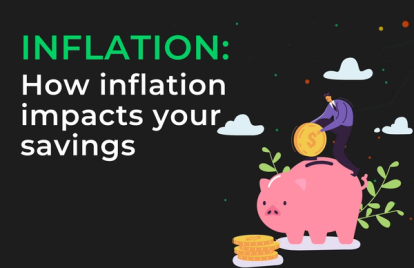How inflation impacts your savings

The cost-of-living crisis poses a serious problem to millions of households all over the UK. With inflation figures currently sitting at 40-year highs and set to climb higher, savers are seeing their purchasing power decline substantially.
We know that the current economic climate can be overwhelming, so we’ve put together this guide to help you understand how inflation impacts your savings and what you can do to minimise some of the effects of inflation on your finances.
What is inflation?
In simple terms, inflation is a general increase in the prices of goods and services over time. At the moment, many factors are contributing to this increase in prices, including rising energy bills, higher petrol and diesel costs, and rising food prices.
For example, inflation is the reason that a loaf of bread cost 10p back in 1971 compared to £1.06 in 2021, or £1.20 in 2022. That 14p increase on a loaf of bread in the space of one year might not seem like much. But when the prices of all typical consumer items – bills, food, clothes, and so forth – are tallied up, it can amount to a very significant increase in the cost of living.
Inflation and your savings
Many savers will also have noticed that their money held in savings accounts hasn’t grown much in recent years. Here, you get the double-whammy of low interest rates and rising inflation, which can reduce the value of your savings in real terms. For example, if you were to keep £1,000 under your bed (we don’t recommend this!), you wouldn’t be able to buy as much with that money in five years’ time as you could today. Although the money is not literally ‘lost’, inflation eats into your purchasing power.
Keeping money in a savings account that earns interest can offset some of the effects of high inflation. However, it’s unlikely that savings in a deposit account will grow fast enough to completely balance out the inflation loss.
The Bank of England sets its interest rates to help the economy and curb inflation. The central bank decided to implement its biggest interest rate increase in 27 years on the 4th August 2022, bringing the base rate to 1.75% from 1.25%. It did this to help bring inflation back down to its target level of 2%.
Though rising interest rates (albeit just 0.5%) may appear to be a positive thing for your savings, at the same time, it means that the cost of borrowing also rises for anyone managing personal loans, credit cards or mortgage payments.
What can I do to combat inflation?
Thankfully, there are several things you can do to help your money grow while inflation is high.
If you have a higher risk appetite, investing your money over the medium- to long-term in funds, shares, bonds or other assets may provide good opportunities to beat inflation and grow your money. That said, there are no guarantees, as the value of your investments can fluctuate as the economic backdrop changes. You should speak to a financial adviser before proceeding to make sure that any investments are suitable for your individual needs.
To grow your wealth with less risk, fixed-term fixed-rate savings accounts are a great option. Although you’ll need to lock your money away with this sort of account, the upside is that you’ll benefit from higher interest rates (compared to instant access accounts) as well as fewer risks than investing in the stock market. What’s more, you know exactly how much you’ll get at the end of the fixed-term, making forward planning easier than ever.
Believe you’ve got a better understanding of how inflation works and how to use it to grow your savings?
At Chetwood Financial, our SmartSave fixed-term fixed-rate saver accounts offer competitive rates to those looking to make the most of their hard-earned money. And whether you’re saving to meet a particular financial goal, or simply to build your wealth over time, you’ll get to choose what happens with your cash at the end of the fixed-term. This means that we’ll never put your money into a deposit account with super-low interest rates, just to keep you on the books. You can choose to re-invest, or withdraw your funds entirely – the decision is entirely yours.





